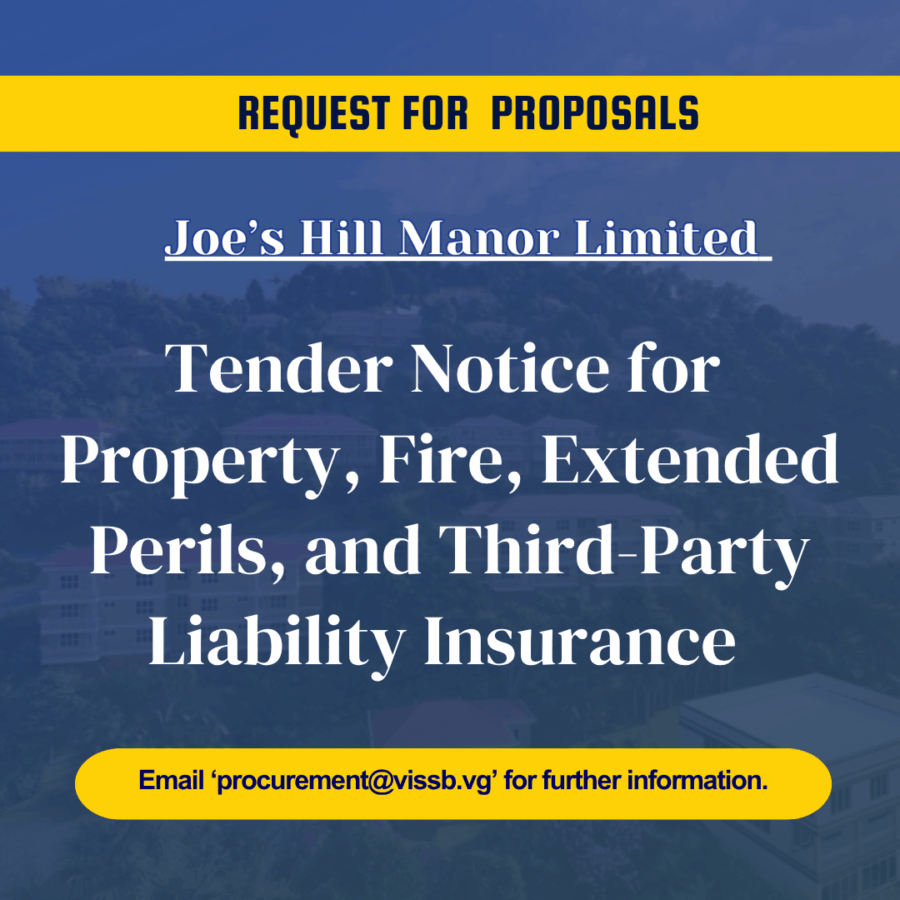‘Underinsurance’ is real, not a scam, says tribunal of experts
The panel of experts that comprise the territory’s one-year-old Insurance Tribunal says the term ‘underinsurance’ — which consistently has been used by local insurers after the 2017 hurricanes — is not a ‘scam word’.
The tribunal made that clear amid recent statements from Virgin Islands Party (VIP) Chairman Andrew Fahie, who has been describing the term as a scam, suggesting that local insurers have been defrauding insured residents.
Insurance expert and tribunal member Violet Gaul contradicted Fahie’s statements while answering questions from members of the media at a conference on Thursday.
“Some persons have described underinsurance as fraud but underinsurance is actually a term that you’ll find in the insurance policy — your homeowners’ policy,” she said.
She further noted that underinsurance might be viewed as fraud if, for example, it is confused with ‘coinsurance’. But Gaul said there is a major difference between coinsurance and underinsurance.
“There is a coinsurance clause in most homeowners policy where if the insured [person] insure their property for 80 percent of the value of that property then no penalty applies. However, if you insure your property for half the value of the property, then the underinsurance clause will apply. But both clauses are part of your insurance contract,” Gaul said.
Public education needed on insurance
She said she believes persons generally don’t pay deep attention to the insurance policies they sign.
“People need to be educated about insurance and I think that’s where a lot of the problems came from,” Gaul said.
“There is a lot of ignorance all around,” added tribunal chairman and attorney, Jack Husbands
He said: “Most people weren’t aware of underinsurance. [They] haven’t even heard the word. And I’m talking about lawyers who studied insurance law. A lot of people were not aware.”
Laws needed for insurance companies to highlight ‘fine print’
That said, Husbands and the tribunal are now considering to recommend that the local insurance laws be amended to compel insurance companies to write policies in a way that better inform persons to concepts like underinsurance straight away.
Husbands said: “We will be making a report to the Financial Services Commission on whether Section 71 of [the territory’s insurance laws] should be broadened [in relation to] questionable ‘fine-printed policies’ and what should be done to draw the attention of the insured the conditions that people generally called fine print.”
READ: 41 claims settled by insurance tribunal, insurance laws need updating
Copyright 2025 BVI News, Media Expressions Limited. All Rights Reserved. This material may not be published, broadcast, rewritten or distributed.





















Is foy a misleader?
IT IS A SCAM!!!! STOP JUSTIFYING YOUR THE CHEQUES YOU’RE GETTING !!!
If you don’t fully or substantially insure or cover the value of your property relative to losses, how can you claim 100% of the costs to restore that property. It is the same as if I don’t own 100% of a rental property then I cannot claim 100% of the rent. Pay insurance to cover the full or substantial value of the property and in the event of losses, claim losses fully. People use the Internet …
I unnnerstand but the cost is prohibitive. All my discretionary income to support products and services of the small business providers will be pinched to pay this. Its going to hit our society this 2019 onwards.
The tribunal is correct, but what they don’t mention is the allegation which I heard repeatedly in the aftermath of the Hurricanes was some that some insurance companies had been actively encouraging the public for years to take out policies which were deliberately under insured to save on premiums (making that insurance company *appear* cheaper than their competitors).
But, crucially, they were allegedly doing so *without* explaining to the policy holders the catastrophic effect that this would have if they ever had to make a claim.
If there is any truth to that, then this sort of mis-selling of policies to the public is something that needs to be thoroughly investigated.
No chance of any investigation. The FSC is far too cowardly to try and investigate the insurance companies.
This practice of encouraging customers to buy underinsurance, if true, to sell more policies is despicable and probably can be cause for loss or at least suspension of license, if a license is needed to “hawk” insurance. These agents care more about themselves than customers. Assuming that the allegation is true, insurance companies have gotten away with it until now because of the length of time between major storms. Now the chicken has come home to roost
Fahie one of the contenders for leader of this country must be much more responsible in his public discourse. I would expect a leader to understand the issues and come up with sensible solutions instead of making sensational and erroneous statements!!! Shame on you FAHIE!!! How do you expect to negotiate and work collaboratively with the insurance companies and develop reasonable policies and regulations going forward to ensure that the best interest of policyholders is achieved??? You are a scam not the insurance companies!!!
One of the insurance company’s totally ignored my claim for over a year. Nothing to do with under insurance everything to do with trying to duck their responsibilities. It worked too as I settled for a lot less than the damage incurred because the tribunal where on their side all the time and put me under great pressure to settle.
Never again will I invest a penny in the BVI
I’m wading into some deep waters without a life preserver. Nonethless, IMO, coinsurance and underinsurance are closely related but with a slight difference. Under both scenarios, the insured/property owner comes out of pocket. Most property insurance companies set a maximum payout value, deductible (either a % or dollar value), and an annual inflation guard, to minimize their obligations/payout. Coinsurance and underinsurance may be better explained with examples.
Coinsurance: Sharing of loss(s) between insurer and insured. For example, if the replacement value of a property is $500, 000.00 with a $20,000.00 deductible and an 80% coinsurance factor and the property owner insures it for $400,000.00 (80% of replacement cost), any lost up to $400, 000.00 minus the deductible will be covered at a 100%.
On the other hand, if the same property was insured for $250, 000.00 (50% of replacement value) and the property owner suffered a $100,000.00 loss, the property owner would not be reimbursed a 100% for the loss. The property owner would be out of pocket $42,500.00 {250,000/ (0.8×500,000) X100,000-20,000}; the 20,000 is the deductible.
Underinsurance: Simply is a property owner insuring a property for less than the replacement cost. Let’s say a property owner insures a property for $200,000.00 with a $20,000.00 deductible and if the property incurs a $300,000.00 lost, the property owner’s out of pocket cost will be $120,000 {300,000-($200,000-$20,000)}.
Though underinsurance may be real, a full investigation should be confucted to ascertain why so many property owners were underinsured. Further, more effective insurance policies may need to be crafted, put in place and enforced to protect both insurers and insureds. Additionally, a public education and outreach programme also needs to be launched. The insureds must understand what they are signing; signing is acknowledging that one fully read and understands all the terms and conditions in the documents. Reading all the legalese in the fine print may be time consuming and laborious but it is important that it is done.
I do not understand why so many people were under insured. My insurance company had sent a letter 3 years before Irma explaining that all properties need to be insured at $ 300 per square-foot to not be under insured. I can’t have been the only person receiving this letter from CIL. It was painful and I can only assume that some people didn’t want to spend the money for such a high insurance coverage and premium.
@Concerned, $300 per square foot. wow! For a small 2,000 square foot house, the construction cost would be $600,0000.00. Just curious as to what the monthly premium would be for a $600,000.00 property replacement? No doubt, high premiums were a factor in properties being underinsured. Of course, when there is more month than money, people will have to prioritized and take some risks. Food, shelter, clothing, medical, transportation……..etc. may come first. As others have noted, complacency may have also been a factor, for there was a long interval between major storms. There are generations of Virgin Islanders that have not experienced a major hurricane. Surely, going forward the attitude and need may change.
That is why you should never go to your insurers without an attorney present.
Insurers tend to scam those without legal representation.
Instead of wasting on useless investments, expert legal advice is the way to go!
@Ausar, this is an added expense for consumers. Consumers shouldn’t need an attorney to resolve routine claims. If there are complex and voluminous claims, no problem; in such a case an attorney is advisable. Nonetheless, what is needed is strong, reasonable property insurance policy(s) that is enforced. True, from time to time, a claim may need to go to mediation and arbitration, if needed.
Clearly, customers need educating on the insurance products that they are buying. Concur with E. Leonard’s suggestion of a public education and outreach program. HLSCC can be assigned this task. For starters, insurance companies need to immediately review all policies with policy holders. Government needs to make this happen. With the payouts after Irmaria, how solvent are the insurance companies? Insurance premiums are through roof, no pun intended.
The problem is more profound than underinsurance or coinsurance. Given the small size of the territory (59 square miles, ~32,000 population), insurance premiums may be too costly and unaffordable for the masses. Instead, they look for other options (underinsurance) which carry a lower premium but clearly is insufficient to cover major damages, ie, catastrophic hurricanes (Irma and Maria). Property insurance is the pooling of resources by insureds to protect property and avoid/minimize financial losses. The larger the pool, the lower the premiums paid by individual policy holders.
Further, the long interval between major storms hitting the BVI (some estimated the 1924 gale) was on the one hand a good thing but on the other hand, it may have created a costly sense of complacency. The complacency may have lulled many into either having no insurance or underinsuring. Both options are risky and costly, though being underinsured is a notch better. Further, there is an allegation being floated that some insurers was probably encouraging customers to opt for underinsurance to sell more policies. Oh, it is an allegation but if true is poor customer service, poor business practice and ill-served customers. If true, this devious practice must stop now. The hefes in insurance must put the word out in no uncertain terms and part ways with any agent(s) that engaged in this below the belt practice. Big problem with no easy solutions.
As others have noted, an ad hoc committee (think tank) should be commissioned to look into the weaknesses and provide recommendations for strengthening and improving the service. The task of the tribunal was I’m assuming was to mediate the disagreement between insurers and insureds.
There is a very simple solution. Insurance companies should indicate clearly on your insurance certificate (not in the fine print) what percentage of the replacement value is insured. They should not be allowed to determine that after a disaster. Let the facts be clear when we are making payments, not when we are making claims. Change the law to require this.